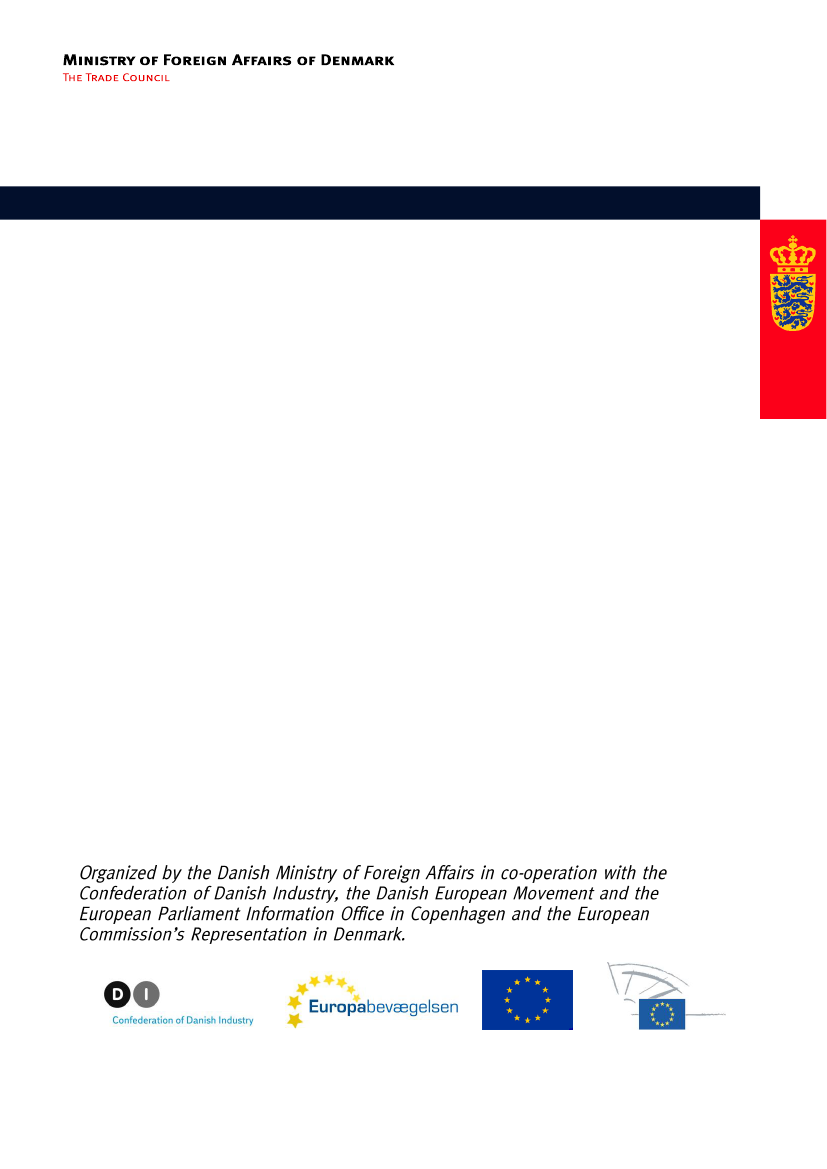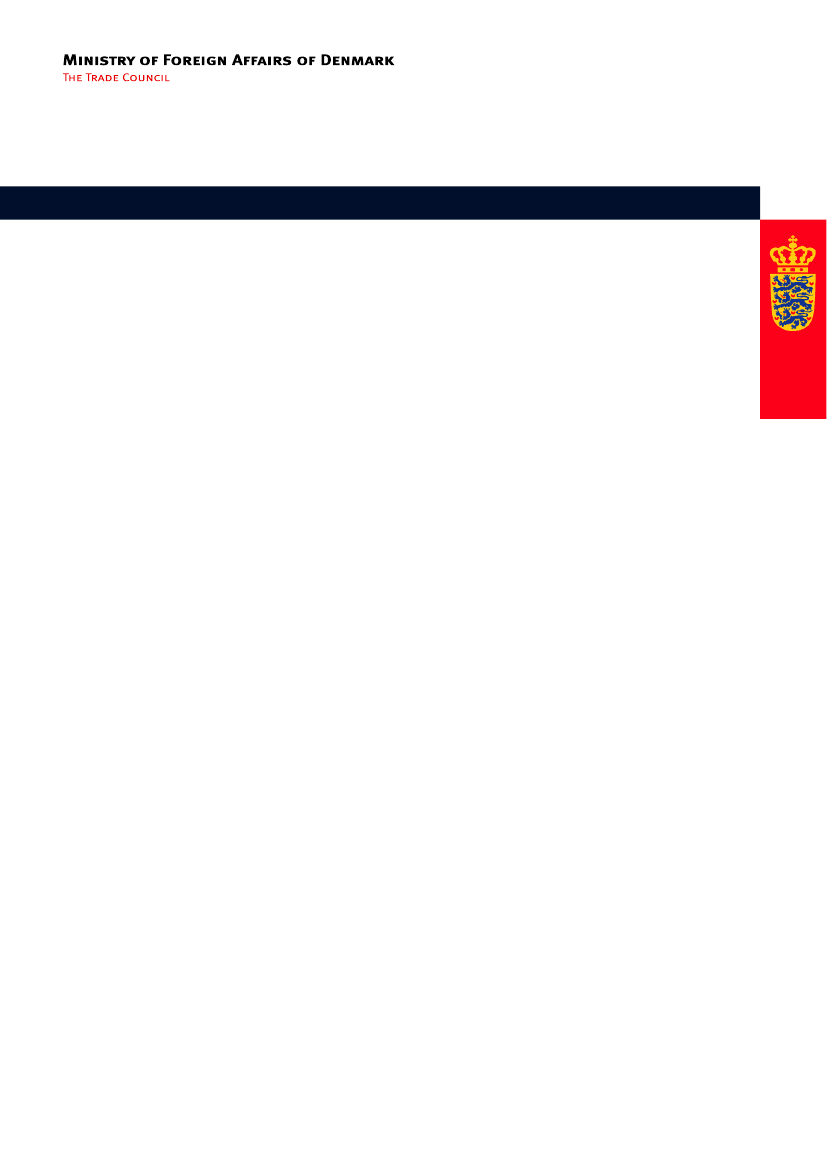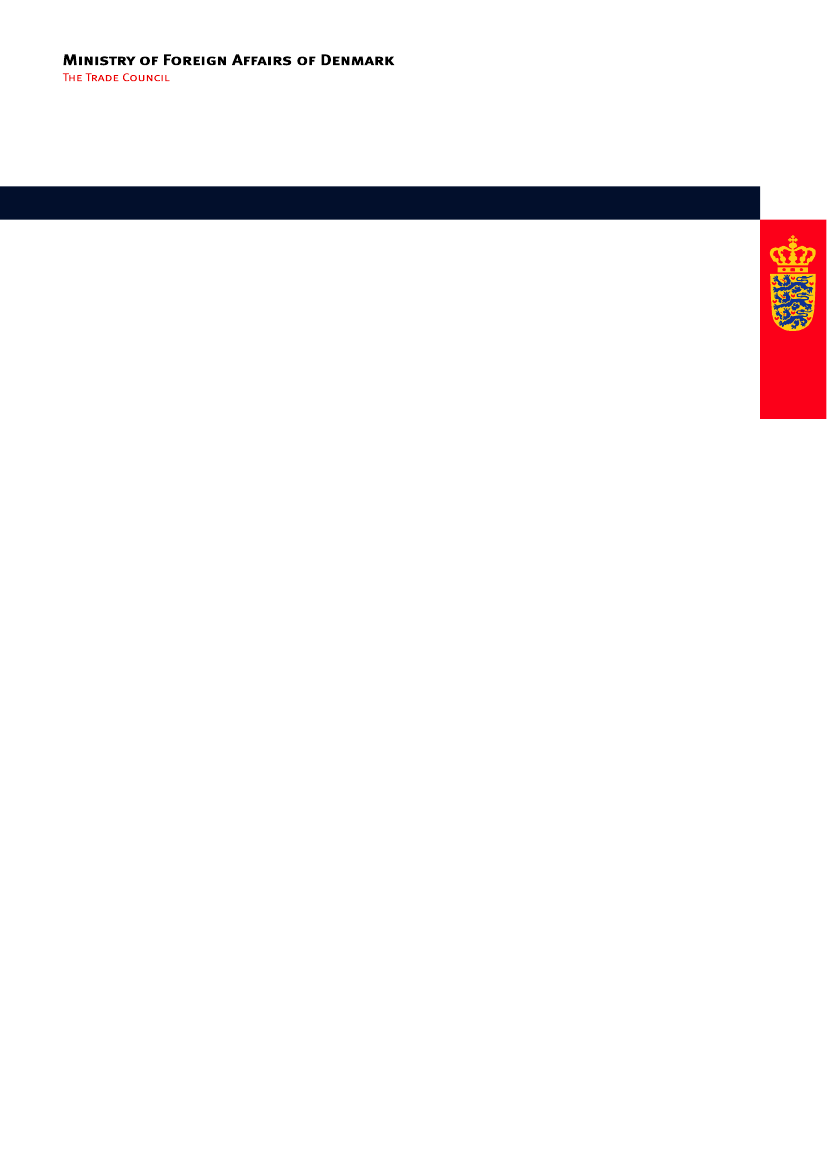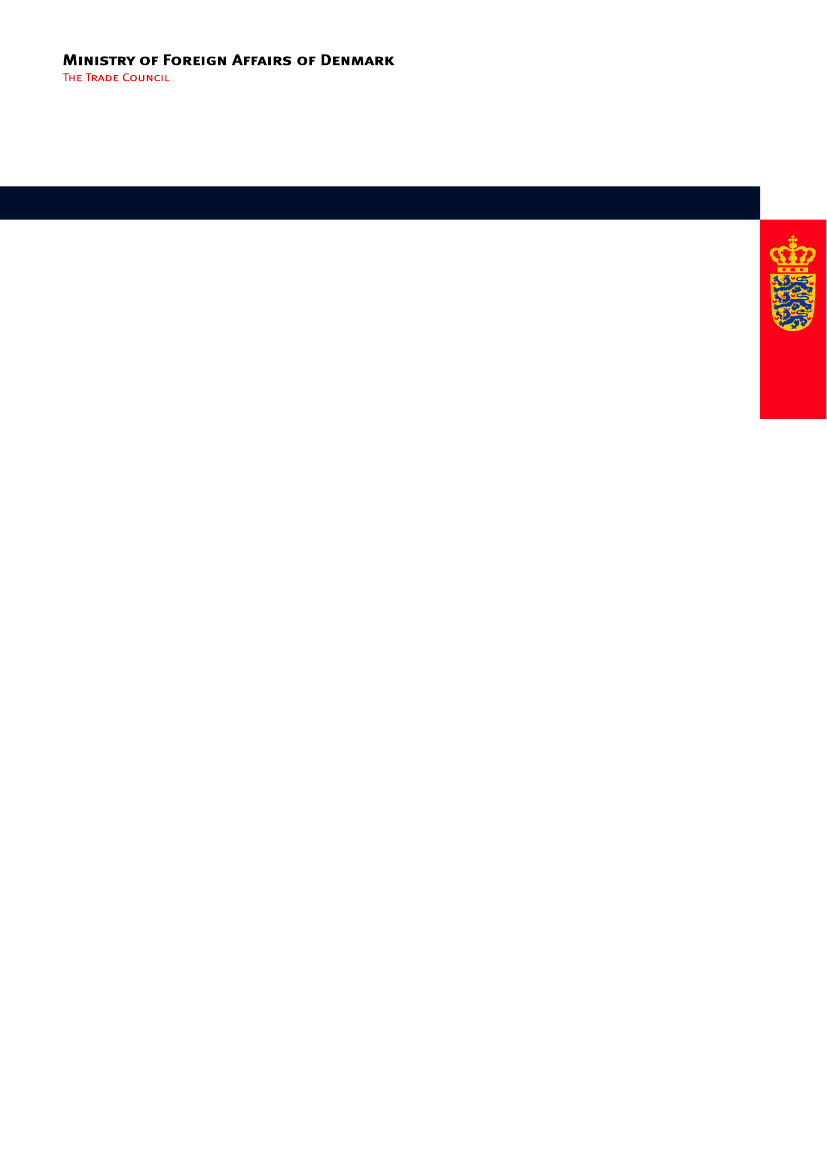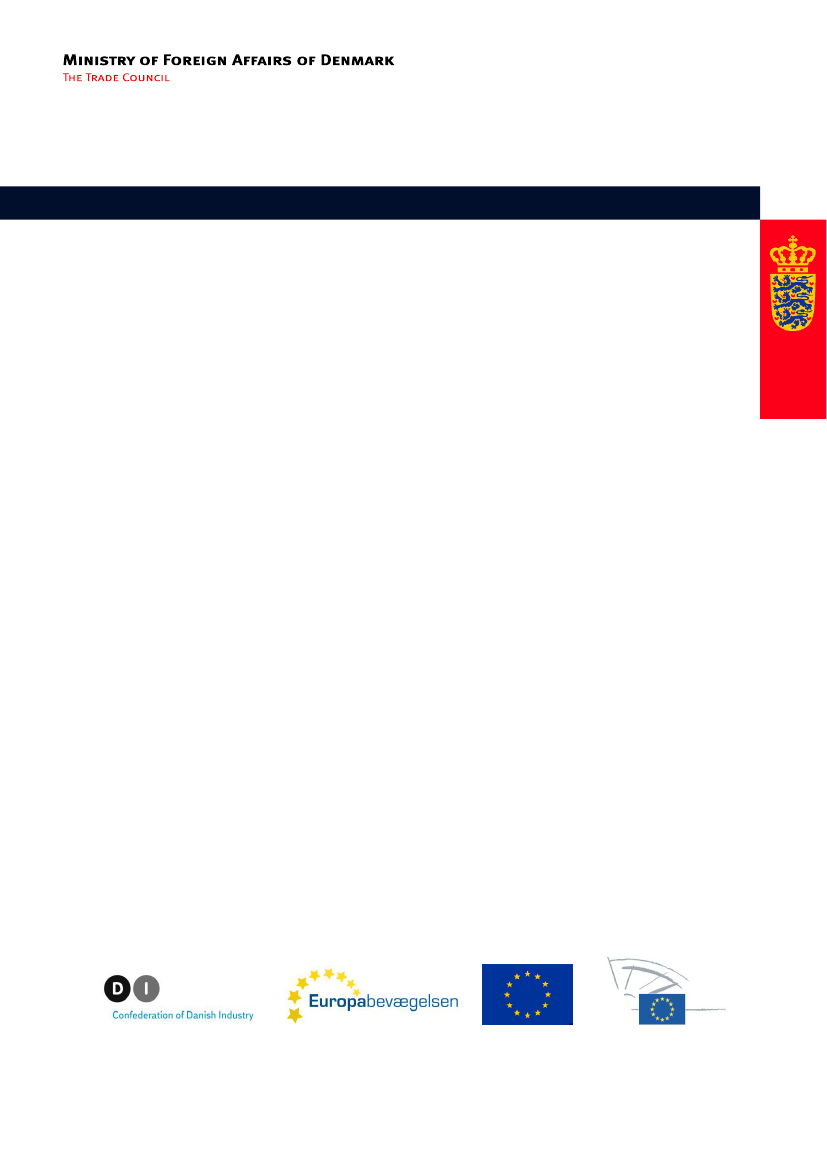Erhvervs-, Vækst- og Eksportudvalget 2011-12
ERU Alm.del Bilag 83
Offentligt
CONFERENCE ON TRADE POLICY ANDTHE DANISH EU PRESIDENCYDECEMBER 8TH, 2011 AT 10:30 – 16:30THE DANISH PARLIAMENT, CHRISTIANSBORG PALACE, FÆLLESSALEN
CONFERENCE ON TRADE POLICY ANDTHE DANISH EU PRESIDENCYDECEMBER 8TH, 2011 AT 10:30 – 16:30THE DANISH PARLIAMENT, CHRISTIANSBORG PALACE, FÆLLESSALEN
The upcoming Danish EU presidency takes place at a critical time for Europeandevelopment. The effects of the economic crisis have proven to be an immense challengefor the EU and have created financial turmoil in many member states. Trade policy is keyto ensuring employment and growth in the European Union and getting through theeconomic crisis.As the largest economic actor in the world, and an important trade partner to the US andemerging economies like China and India, it is vital that the EU translate this economicstrength into new market opportunities and more free and fair global trade. Therefore tradepolicy will be high on the EU agenda in the coming years.EU trade policy is conducted on a background of rising global protectionism, ailingnegotiations in the Doha Development Round and an increasing number of bilateralFTA’s.In addition, the Lisbon Treaty has meant significant changes to the handling of trade policyin the EU. Now, the European Parliament is fully involved through the ordinary legislativeprocedure. And the European Parliament must approve all trade agreements with thirdcountries. Finally, it is a major ambition of the Lisbon Treaty to achieve coherence andsynergy between the external policies of the EU as well as to achieve global leverage.
On this background and with the trade policy priorities for the upcoming Danish EUpresidency as an underlying basis, the Conference will examine how EU trade policy cancontribute to achieving the political and economic goals of Denmark and the EuropeanUnion. How do we promote a positive global trade agenda in light of the situation in theworld economy? How do we avoid mutual protectionism? The European Union hasopened its public procurement – should the EU demand similar openness from thegrowing economies? Does the current strong political focus on growth and employmenthave significance for political clauses in bilateral trade agreements, including democracyand human rights? In what ways can trade policy contribute to long lasting stabilization anddevelopment of new markets while at the same time being a catalyst for change towardsmore open societies? Finally the global climate challenge is still with us – it remainsimperative that we remain focused on how to use trade as a driver for global green growth,including initiatives such as the Sustainable Energy Trade Agreement.The Conference will examine these and other relevant issues related to the implementationof the future EU trade policy as outlined in the European Commission Communication“Trade, Growth and World Affairs”, November 2010.
10.3011.0011.1011.3011.5012.3013.30
RegistrationWelcome by Lars Thuesen, State Secretary for Trade and Strategy, AmbassadorPia Olsen Dyhr, Minister for Trade and InvestmentKarel De Gucht, EU Commissioner for TradeQ&A moderated by Lars Thuesen, State Secretary for Trade and Strategy, AmbassadorLunchIntroduction to the second part of the conference by Erik Boel, President of the DanishEuropean MovementThomas Bustrup, Deputy Director General, Confederation of Danish Industry: How cantrade policy contribute to European growth?1stPanel discussion: EU2020: Growth and Trade Policya) Hosuk Lee-Makiyama, Director, ECIPEMultilateralism or bilateralism – advantages and drawbacks? Which path for Europe?b) Peter Brun, Senior Vice President, Group Government Relations, Vestas Wind SystemsA/SHow should European governments and institutions provide better internationalframework conditions for European business exports to third countries, including in thearea of sustainable energy?c) Signe Ratso, Director ofinter aliaMarket Access, DG TradeMarket access for European companies: What are the main challenges and how willEurope take action?
13.35
13.45
14.15
Q&A moderated by Peter Thagesen, Director International Market Policy, Confederation ofDanish IndustryCoffee2ndPanel: “European Trade Policy in a new dress; trade policy decision-making under theLisbon Treaty.a) Pascal Kernies, Managing Director for European Service Forum (ESF) How doesbusiness make itself heard in the European Parliamentb)Morten Løkkegaard, MEP, ALDEHow will the European Parliament use its new competence in the area of trade policy?
14.3514.50
c) Margrete Auken, MEP, Greens/ALEIs there a "left and right" in trade policy – or is there a cross-party consensus on freetrade? How does the EP reconcile trade and development policies?d) Mieczyslaw Nogaj, Current Chairman of Trade Policy CommitteeWhat experiences has the Polish Presidency gained during the presidency? What are therecommendations and priorities for to the upcoming Danish Presidency?15.30:16.00Q&A moderated by Søren Kelstrup, Ambassador for Trade, TPC TitulaireReception and networking
